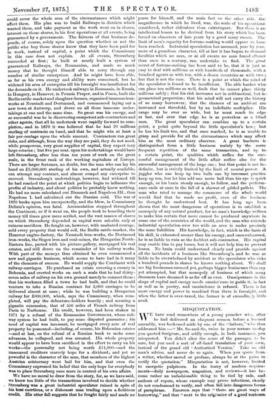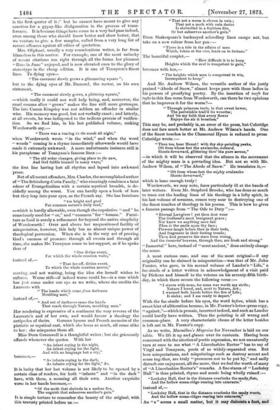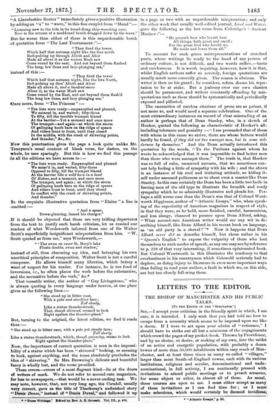MISQUOTATION.
WE have read somewhere of a young preacher who, after- he had delivered an eloquent sermon before a learned assembly, was beckoned aside by one of the ',fathers," twho thus- addressed him :—" Mr. So-and-So, twice in your sermon to-day you quoted Scripture, and oddly enough, in both instances, .yom misquoted. You didn't alter the sense of the passages, to be - sure, but you used a sort of off-hand translation of your own, instead of the grand old ' Authorised Version.' Take an old man's advice, and never do so again. When you quote from a writer, whether sacred or profane, always be at the pains to - verify the quotation." Misquotation is not, however, limited to energetic pulpiteers. In the .hurry of modern • require- ments—daily newspapers, magazines, and reviews---it has be- come rather an unfashionable thing to be tied by rule, and authors of repute, whose example may prove infections, clearly do not condescend to verify, and often fall into dangerous forma. of paraphrase. Emerson says that "there are great ways of borrowing," and that "next to the originator of a good-sentetax
is the first quoter of it ;" but he cannot have meant to give any sanction for a gypsy-like disfiguration in the process of trans- ference. It is because things have come to a very bad pass indeed, even among those who should know better and show better, that we venture to give a few samples, culled from a very long list of recent offences against all ethics of quotation.
Mrs. Oliphant, usually a very conscientious writer, is far from blameless in this matter. For example, one of the most unlucky of recent citations ran right through all the forms her pleasant "Rose in June" enjoyed, and is now elevated even to the glory of stereotype in the cheap edition. It is one of Tennyson's finest lines. To dying eyes-
" The casement slowly grows a glimmering square ";
but to the dying eyes of Mr. Damerel, the rector, on his own statement,
" The casement slowly grows, a glittering square," —which really it could not well help being, and, moreover, the cruel comma after "grows" makes the line still more grotesque. The late Canon Kingsley was not seldom an offender in similar wise. His memory was good, but not verbally exact ; and latterly, at all events, he was indisposed to the tedious process of verifica- tion. So we find him, in his last published volume, making Wordsworth say,— "There was a roaring in the woods all night,"
when Wordsworth wrote " in the wind," and when the word woods" coming in a rhyme immediately afterwards would have made it extremely awkward. A more unfortunate instance still is his paraphrase of Tennyson's famous lines :—
" The old order changes, giving place to the new,
And God fulfils himself in many ways,"
the first line having lost all rhythm and lapsed into awkward prose.
But of all recent offenders, Mrs. Charles, the accomplished author of "The Schonberg-Cotta Family," who cunningly combines a faint odour of Evangelicalism with a certain mystical breadth, is de-
cidedly among the worst. You can hardly open a book of hers but they leap into your eyes, as the French say. She has furniture "too bright and good
For common nature's daily food,"
—which is hardly allowable, even though the copulative " and " be consciously used for " or," and " common" for " human." Furni- ture as food is surely a refinement far beyond the native simplicity of Wordsworth ! Over and above her unquestioned facility of misquotation, however, this lady has an almost unique power of theological perversion. When she is in the very act of proving God's oneness of presence through all events and through all time, she makes Mr. Tennyson come to her support, as if he spoke thus of
" One divine event, For which the whole creation waits," "That far-off, divine event, To which the whole creation moves,"
moving, and not waiting, being the idea she herself wishes to enforce. Worse still—if indeed worse could be—is a case which has just come under our eye as we write, where she credits the Laureate with " The hands which come from darkness Moulding men," instead of,- " And out of darkness came the hands
That reach through Nature, moulding men."
Her rendering is expressive of a sentiment the very reverse of the Laureate's and of her own, and would favour a theology the antipodes of theirs. German hymns and French memoirs of the pietistic or mystical cast, which she loves so much, all come alike to her ; she misquotes them all.
Miss Dora Greenwell is a thoughtful writer; but she grievously offends whenever she quotes. With her
"An infant crying in the night, An infant crying for the light, And with no language but a cry," becomes,— "As infants crying in the dark,
As infants crying for the light," &c.
It is lucky that her last volume is not likely to be opened by a certain class of readers, for both " infants " and "in the dark" have, with them, a meaning all their own. Another exquisite verse in her hands becomes,— " Of the moth that shrivels in a useless fire,
The anguish that subserves another's gain."
It is simple torture to remember the beauty of the original, with this travesty printed before us :—
instead of,— " That not a worm is cloven in vain ;
That not a moth with vain desire Is shrivelled in a fruitless fire, Or but subserves another's•gain."
Even Shakespeare's hackneyed schoolboy lines escape not, but take on a new colour from her pen :—
" There is a tide in the affairs of men Which, taken at the rise, leads on to fortune."
The beautiful couplet,—
"How difficult it is to keep
Heights which the soul is competent to gain,"
becomes with her,-
" The heights which man is competent to win, Incompetent to keep."
And Mr. Andrew Wilson, the versatile author of the justly praised "Abode of Snow," almost keeps pace with these ladies in his powers of prosifying poetry. By the insertion of turfs for tufts in this fine verse from Wordsworth, can there be two opinions that he improves it for the worse?— "Through primrose turfs, in that sweet bower, The periwinkle trail'd its wreaths; And 'tis my faith that every flower Enjoys the air it breathes."
This may be, and probably is, an error of the press, but Coleridge does not fare much better at Mr. Andrew Wilson's hands. One of the finest touches in the Chamouni Hymn is reduced to prose Coleridge wrote
Then too, hoar Mount ! with thy sky-pointing peaks, Oft from whose feet the avalanche, unheard, Shoots downward, glittering thro' the pure serene," —in which it will be observed that the silence in the movement of the mighty mass is a pervading idea. But not so with Mr. Andrew Wilson, of "The Abode of Snow." He translates it,— " Oft from whose feet the mighty avalanche Shoots downward,"
which is lame enough truly !
Wordsworth, we may note, fares particularly ill at the hands of later writers. Even Mr. Stopford Brooke, who has done so much to trace out the leading lines of his theology in a lofty spirit, in his last volume of sermons, comes very near to destroying one of the finest touches of theology in his poems. This is how he gives a famous passage from " The Ode to Duty " :—
" Eternal Lawgiver ! yet thou dost wear
The Godhead's most benignant grace ;
Nor know we anything more fair Than is the smile upon thy face ;
Flowers laugh before thee in their beds, And fragrance in their footing treads; Thou dost preserve the stars from wrong,
And the immortal heavens, through thee, are fresh and strong."
"Immortal" here, instead of "most ancient," does entirely change the sense.
A most curious case, and one of the most original—if any originality can be claimed in misquotation—was that of Mr. John Forster, who gave, in his second volume of Landor's "Life," a fac-simile of a letter written in acknowledgment of a visit paid by Dickens and himself to the veteran on his seventy-fifth birth- day, in which there occurs the following verse :—
"I strove with none, for none was worth my strife ; Nature I loved, and, next to Nature, Art ; I warmed both hands before the fire of Life; It sinks; and I am ready to depart."
With the fac-simile before his eyes, the word before, which has a sweet hint of alliteration became, in Mr. Forster's letter-press copy, " against,"—which is prosaic, incorrect indeed, and such as Landor could hardly have written. Then the pointing is all wrong and common-place. A very characteristic clause of the letter besides is left out in Mr. Forster's copy.
As we write, Macmillan's Magazine for November is laid on our table. We lift it up and glance over its contents. Having been concerned with the niceties of poetic expression, we not unnaturally turn at once to see what " A Lincolnshire Rector" has to say of Virgil and Tennyson, poets of so widely-separated eras. But here misquotations, and mispointings such as destroy accent and sense together, are truly "presences not to be put by," and sadly disturb our enjoyment, all the more, that we feel the worth of many of "A Lincolnshire Rector's" remarks. A fine stanza of " Locksley Hall " is thus printed, rhyme and music being wholly ruined :— " Locksley Hall, that in the distance overlooks the sandy fiats, And the hollow ocean-ridge roaring into cataracts."
instead of,— " Locksley Hall, that in the distance overlooks the sandy tracts, And the hollow ocean-ridges roaring into cataracts,"
An " s " seems a small matter, but it may dislocate a foot, and "A Lincolnshire Rector" immediately gives a positive illustration by adding an "s" to "wave," in this fine couplet from " Maud ":—
"Listening now to the tide in its broad-flung ship-wrecking roar,
Now to the scream of a maddened beach dragged down by the wave."
But far worse than either of these is this unpardonable botch oof quotation from " The Last Tournament :"--
" They fired the tower, Which half that autumn night like the live north Red-pulsing up through Alioth and Alior Made all above it as the waters Moab saw
• Come round by the east. And out beyond them flushed The long, low dune and lazy-plunging sea,"
instead of this :—
" They fired the tower Which half that autumn night, like the live North, Red-pulsing up thro' Alioth and Alcor
Made all above it, and a hundred meres About it, as the water Moab saw
Come round by the East, and out beyond them flush'd The long low dune, and lazy plunging sea."
Once more, from " The Princess" :— "The lists were ready—empanoplied and plumed, We entered in, and waited ; fifty-three To fifty, till the terrible trumpet blared At the barrier—Yet a moment and once more The trumpet—and again—at which the storm Of galloping hoofs bare on the ridge of spears And riders front to front, until they closed In the middle, with the crash of shivering points, And thunder," &c., &c.
/Tow this punctuation gives the page a look quite unlike Mr. Tennyson's usual contour of blank verse, for dashes, on the whole, he uses sparingly. But this is how we find this passage tin all the editions we have access to :—
" The lists were ready. Empanoplied and plumed We enter'd in, and waited, fifty-three Opposed to fifty, till the trumpet blared At the barrier like a wild horn in a land Of Echoes, and a moment, and once more The trumpet, and again ; at which the storm Of galloping hoofs bare on the ridge of spears And riders front to front, until they closed In conflict with the crash of shivering points, And thunder."
In the exquisite illustrative quotation from " Elaine " a line is
,omitted
" And a spear, Down-glancing, lamed his charger."
If it should be objected that these are very trifling departures from the text to justify such harsh criticism, let us remind our .readers of what Wordsworth inferred from one of Sir Walter Scott's superficially insignificant misquotations from him. "W. Scott quoted as from me," says Wordsworth,— "'The swan on sweet St. Mary's lake Floats double, swan and shadow,' instead of still, thus obscuring my idea, and betraying his own uncritical principles of composition. Walter Scott is not a careful .composer. He allows himself many liberties, which betray a want of respect for his reader. For instance, he is too fond of inversions, i.e., he often places the verb before the substantive, and the accusative before the verb," &c.*
That versatile writer, the author of " Guy Livingstone," who is always quoting in every language under heaven, at one place ,gives us the following lines :—
*She stood up in bitter case, With a pale and stead fist face ;
Toll slowly, Like a statue thunderstrook,
That, though shivered, seemed to look
Right against the thunder-place."
But, turning to the original, the latest edition, we find it reads thus :—
".She stood up in bitter case, with a pale yet steady face;
Toll slowly.
Like a statue thunderstruck, which, though quivering, seems to look Right against the thunder-place."
Now, the importance of correct quotation is seen in the impossi- bility of a statue which has been " shivered " looking, or seeming to look, against anything, and the tense absolutely precludes the idea of "shivering." So Mrs. Browning's delicate and beautiful fancy is wholly lost, and the verse prosified.
These errors—errors of a most flagrant kind—lie at the doors df writers of mark. We do not refer to second-rate magazines, far lees to newspapers,—that would be a never-ending task. We may note, however, that, not very long ago, the Cornhill, usually very correct, gave as the title of Thackeray's unfinished story -"Denis Donne," instead of "Denis Duval," and followed it up
• •" Press Writings." Edited by Ref. A. B. Urosart. Vol. III., p. 462.
in a page or two with an unpardonable misquotation ; and only the other week that usually well-edited journal, Land and Water, gave the following as the last verse from Coleridge's " Ancient Mariner :"-
"Ho prayeth best who loveth best
All things, both great and small ; For the great God who broth us, He made and loves them all."
To account for such grave misrepresentations of standard poets, whose writings lie ready to the hand of any person of ordinary culture, is not difficult, and two words suffice,—haste and carelessness. It is worth inquiring, however, how it is that, whilst English authors suffer so severely, foreign quotations are usually much more correctly given. The reason is obvious. The writer is then on his guard ; he considers, refers, deems his repu- tation to be at stake. But a jealousy over our own classics should be paramount, and writers constantly offending by mis- quotations such as these should be systematically and periodically exposed and pilloried.
The enormities of careless citations of prose are as patent. if not more so, and would need a separate celebration. One of the most extraordinary instances on record of clear misreading of an author is perhaps that of Dean Stanley, who, in a sketch of Hooker, quoted the following as characteristic of Hooker's all- including tolerance and geniality :—" I am persuaded that of them with whom in this cause we strive, there are whose betters would hardly be found, if they did not live amongst men, but in some wil- derness by themselves." And the Dean actually introduced this quotation by the words, "To the Puritans against whom he wrote he acknowledged that it was impossible to find better men than those who were amongst them." The truth is, that Hooker was so full of calm, unmoved sarcasm, that we sometimes can- not help feeling a little of sympathy with his wife ; and the above is an instance of his cool and irritating attitude, so hiding it- self under assumed politeness as to cheat even a master like Dean Stanley. In this case certainly the Dean has been a little too facile in forcing men of the old type to illustrate the breadth and ready sympathy which he so admirably illustrates and pleads for. Per- haps a still worse case than the Dean's was that of Colonel Went- worth Higginson, author of "Atlantic Essays," who, when speak- ing of the superiority of American magazines in respect of style, in that they were, as he held, more finished, careful, harmonious, and less slangy, chanced to pounce upon Dean Alford, asking, " What second-rate American writer would see any wit in de- scribing himself, like Dean Alford in his recent book on language, as 'an old party in a shovel?'"* Now it happens that Dean Alford never did so describe himself, but chose rather in his " Queen's English " to expose the vulgarity of those who lent themselves to such modes of speech, as any one may see by reference to p. 228 of that very interesting, if sometimes opinionated book. But Colonel Wentworth in this illustrates the tendency to that overhastiness in his countrymen which Griswold seriously had to deplore, as doing injury to literature in even more important ways than failing to read your author, a fault in which we, on this side, are but too closely following them.




































 Previous page
Previous page